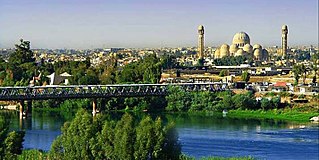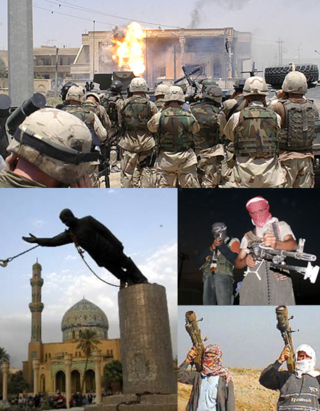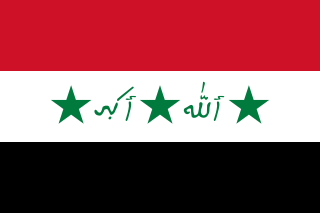
Baghdad is the capital of Iraq and the second-largest city in the Arab world after Cairo. It is located on the Tigris near the ruins of the ancient city of Babylon and the Sassanid Persian capital of Ctesiphon. In 762 CE, Baghdad was chosen as the capital of the Abbasid Caliphate, and became its most notable major development project. Within a short time, the city evolved into a significant cultural, commercial, and intellectual center of the Muslim world. This, in addition to housing several key academic institutions, including the House of Wisdom, as well as a multiethnic and multi-religious environment, garnered it a worldwide reputation as the "Center of Learning".

The Euphrates is the longest and one of the most historically important rivers of Western Asia. Together with the Tigris, it is one of the two defining rivers of Mesopotamia. Originating in Turkey, the Euphrates flows through Syria and Iraq to join the Tigris in the Shatt al-Arab, which empties into the Persian Gulf.

The Iran–Iraq War was an armed conflict between Iran and Iraq that lasted from September 1980 to August 1988. It began with the Iraqi invasion of Iran and lasted for almost eight years, until the acceptance of United Nations Security Council Resolution 598 by both sides. Iraq's primary rationale for the attack against Iran cited the need to prevent Ruhollah Khomeini—who had spearheaded Iran's Islamic Revolution in 1979—from exporting the new Iranian ideology to Iraq; there were also fears among the Iraqi leadership of Saddam Hussein that Iran, a theocratic state with a population predominantly composed of Shia Muslims, would exploit sectarian tensions in Iraq by rallying Iraq's Shia majority against the Baʽathist government, which was officially secular and dominated by Sunni Muslims. Iraq also wished to replace Iran as the power player in the Persian Gulf, which was not seen as an achievable objective prior to the Islamic Revolution as Pahlavi Iran boasted colossal economic and military strength as well as close relationships with the United States and Israel.

Kurds or Kurdish people are an Iranian ethnic group native to the mountainous region of Kurdistan in Western Asia, which spans southeastern Turkey, northwestern Iran, northern Iraq, and northern Syria. There are exclaves of Kurds in Central Anatolia, Khorasan, and the Caucasus, as well as significant Kurdish diaspora communities in the cities of western Turkey and Western Europe. The Kurdish population is estimated to be between 30 and 45 million.

Saddam Hussein, known mononymously as Saddam, was an Iraqi politician and dictator who served as the fifth president of Iraq from 16 July 1979 until 9 April 2003. A leading member of the revolutionary Arab Socialist Ba'ath Party, and later, the Baghdad-based Ba'ath Party and its regional organization, the Iraqi Ba'ath Party—which espoused Ba'athism, a mix of Arab nationalism and Arab socialism—Saddam played a key role in the 1968 coup that brought the party to power in Iraq.

Kurdistan or Greater Kurdistan is a roughly defined geo-cultural territory in Western Asia wherein the Kurds form a prominent majority population and the Kurdish culture, languages, and national identity have historically been based. Geographically, Kurdistan roughly encompasses the northwestern Zagros and the eastern Taurus mountain ranges.

The Gulf War was a 1990–1991 armed campaign waged by a 35-country military coalition in response to the Iraqi invasion of Kuwait. Spearheaded by the United States, the coalition's efforts against Iraq were carried out in two key phases: Operation Desert Shield, which marked the military buildup from August 1990 to January 1991; and Operation Desert Storm, which began with the aerial bombing campaign against Iraq on 17 January 1991 and came to a close with the American-led Liberation of Kuwait on 28 February 1991.

Faisal I bin Al-Hussein bin Ali Al-Hashemi was King of the Arab Kingdom of Syria or Greater Syria in 1920, and was King of Iraq from 23 August 1921 until his death. He was the third son of Hussein bin Ali, the Grand Emir and Sharif of Mecca, who was proclaimed as King of the Arabs in June 1916.

Mosul is a major city in northern Iraq, serving as the capital of Nineveh Governorate. The city is considered the second largest city in Iraq in terms of population and area after the capital Baghdad, with a population of over 3.7 million. Mosul is approximately 400 km (250 mi) north of Baghdad on the Tigris river. The Mosul metropolitan area has grown from the old city on the western side to encompass substantial areas on both the "Left Bank" and the "Right Bank", as locals call the two riverbanks. Mosul encloses the ruins of the ancient Assyrian city of Nineveh on its east side.

The 2003 invasion of Iraq was a United States-led invasion of the Republic of Iraq and the first stage of the Iraq War. The invasion phase began on 19 March 2003 (air) and 20 March 2003 (ground) and lasted just over one month, including 26 days of major combat operations, in which a combined force of troops from the United States, the United Kingdom, Australia and Poland invaded Iraq. Twenty-two days after the first day of the invasion, the capital city of Baghdad was captured by Coalition forces on 9 April 2003 after the six-day-long Battle of Baghdad. This early stage of the war formally ended on 1 May 2003 when U.S. President George W. Bush declared the "end of major combat operations" in his Mission Accomplished speech, after which the Coalition Provisional Authority (CPA) was established as the first of several successive transitional governments leading up to the first Iraqi parliamentary election in January 2005. U.S. military forces later remained in Iraq until the withdrawal in 2011.

Abdul Latif Rashid, also known as Latif Rashid is an Iraqi Kurdish politician and the ninth president of Iraq, following the 2022 Iraqi presidential election. He was previously the Minister of Water Resources under the government of Nouri al-Maliki. Prior to that, he served in the same position under both the Iraqi Transitional Government and the Iraqi Interim Government. Rashid was formerly a spokesperson for the Patriotic Union of Kurdistan (PUK) in the United Kingdom.

Sulaymaniyah, also spelled as Slemani, is a city in the east of the Kurdistan Region of Iraq, not far from the Iran–Iraq border. It is surrounded by the Azmar, Goizha and Qaiwan Mountains in the northeast, Baranan Mountain in the south and the Tasluja Hills in the west. The city has a semi-arid climate with very hot dry summers and cold wet winters.

Iraqi Kurdistan or Southern Kurdistan refers to the Kurdish-populated part of northern Iraq. It is considered one of the four parts of "Kurdistan" in Western Asia, which also includes parts of southeastern Turkey, northern Syria, and northwestern Iran. Much of the geographical and cultural region of Iraqi Kurdistan is part of the Kurdistan Region (KRI), an autonomous region recognized by the Constitution of Iraq. As with the rest of Kurdistan, and unlike most of the rest of Iraq, the region is inland and mountainous.

The Iraqi invasion of Kuwait was an operation conducted by Iraq on 2 August 1990, whereby it invaded the neighboring State of Kuwait, consequently resulting in a seven-month-long Iraqi military occupation of the country. The invasion and Iraq's subsequent refusal to withdraw from Kuwait by a deadline mandated by the United Nations led to a direct military intervention by a United Nations-authorized coalition of forces led by the United States. These events came to be known as the first Gulf War, eventually resulting in the forced expulsion of Iraqi troops from Kuwait and the Iraqis setting 600 Kuwaiti oil wells on fire during their retreat, as a scorched earth strategy.

Kurdistan Region, abbr. KRI, is an autonomous region in Iraq comprising the four Kurdish-majority governorates of Erbil, Sulaymaniyah, Duhok, and Halabja, and bordering Iran, Syria, and Turkey. The Kurdistan Region encompasses most of Iraqi Kurdistan but excludes the disputed territories of Northern Iraq, contested between the Kurdistan Regional Government and the central Iraqi government in Baghdad since 1992 when autonomy was realized. The Kurdistan Region Parliament is situated in Erbil, but the constitution of the Kurdistan Region declares the disputed city of Kirkuk to be the capital of the Kurdistan Region. When the Iraqi Army withdrew from most of the disputed areas in mid-2014 following the Islamic State’s invasion of Iraq, Kurdish Forces entered the areas and held control there until Iraq retook the areas in October 2017.

The Iraq War was a protracted armed conflict in Iraq from 2003 to 2011 that began with the invasion of Iraq by the United States-led coalition that overthrew the Iraqi government of Saddam Hussein. The conflict continued for much of the next decade as an insurgency emerged to oppose the coalition forces and the post-invasion Iraqi government. US troops were officially withdrawn in 2011. The United States became re-involved in 2014 at the head of a new coalition, and the insurgency and many dimensions of the armed conflict continue today. The invasion occurred as part of the George W. Bush administration's War on terror following the September 11 attacks, despite no connection between Iraq and the attacks.

Iraq, officially the Republic of Iraq, is a country in Western Asia. It is bordered by Turkey to the north, Iran to the east, the Persian Gulf and Kuwait to the southeast, Saudi Arabia to the south, Jordan to the southwest and Syria to the west. The capital and largest city is Baghdad. Iraq is home to diverse ethnic groups including Iraqi Arabs, Kurds, Turkmens, Assyrians, Armenians, Yazidis, Mandaeans, Persians and Shabakis with similarly diverse geography and wildlife. The vast majority of the country's 44 million residents are Muslims – the notable other faiths are Christianity, Yazidism, Mandaeism, Yarsanism and Zoroastrianism. The official languages of Iraq are Arabic and Kurdish; others also recognised in specific regions are Neo-Aramaic, Turkish and Armenian.

The Islamic State (IS), also known as the Islamic State of Iraq and the Levant, Islamic State of Iraq and Syria, and by its Arabic acronym Da'ish or Daesh, is a militant Islamist group and former unrecognized quasi-state that follows the Salafi jihadist branch of Sunni Islam. It was founded by Abu Musab al-Zarqawi in 1999 and gained global prominence in 2014, when it drove Iraqi security forces out of key cities during the Anbar campaign, which was followed by its capture of Mosul and the Sinjar massacre. In Syria, the group conducted ground attacks against both Syrian government forces and Syrian opposition factions. By the end of 2015, it held an area that contained an estimated eight to twelve million people and stretched from western Iraq to eastern Syria, where it enforced its interpretation of Islamic law. ISIL was estimated at the time to have an annual budget of more than US$1 billion and more than 30,000 fighters.

The 14 July Revolution, also known as the 1958 Iraqi coup d'état, took place on 14 July 1958 in Iraq, and resulted in the overthrow of the Hashemite monarchy in Iraq that had been established by King Faisal I in 1921 under the auspices of the British. King Faisal II, Prince 'Abd al-Ilah, and Prime Minister Nuri al-Said were executed by the military.

Ba'athist Iraq, formally the Iraqi Republic until 6 January 1992 and the Republic of Iraq thereafter, covers the national history of Iraq between 1968 and 2003 under the rule of the Arab Socialist Ba'ath Party. This period began with high economic growth and soaring prosperity, but ended with Iraq facing social, political, and economic stagnation. The average annual income decreased both because of external factors such as the heavy sanctions placed on Iraq by Western countries and the internal policies of the Iraqi government.



















